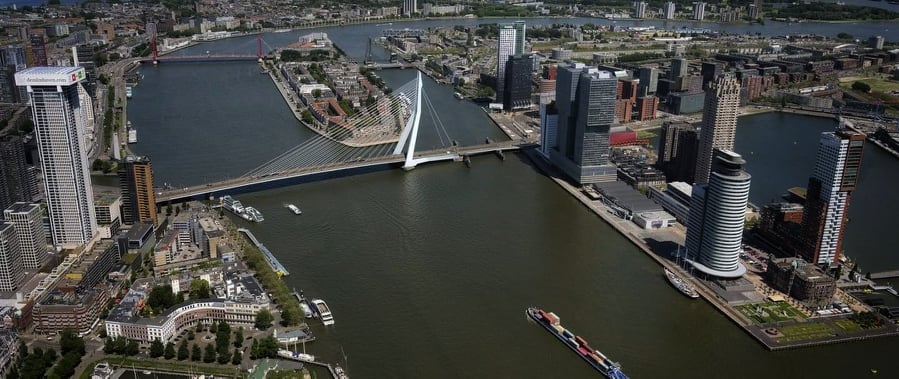The Ukraine war has resulted in several countries (including the European Union) imposing sanctions on Russia.
The latest, eighth round of sanctions adopted by the European Council on 22 October imposed a price cap on crude oil from Russia and prohibits the import of steel, steel products, machines and certain chemical agents. Previously, the EU imposed a ban on the import of Russian oil and petroleum products.

These energy products are subject to a transition period. For crude oil, this period of transition ends on 5 December 2022, while for petroleum products, it will end on 5 February 2023.
Shipping companies had already significantly reduced the number of containers they ship to and from Russia due to the war and the resulting sanctions.
Russia-oriented transhipment
62 million tonnes of the almost 470 million tonnes of transhipment in the port of Rotterdam is Russia-oriented (13%) (source: CBS).
Many energy carriers are imported from Russia via the port of Rotterdam. Roughly speaking, 30% of crude oil comes from Russia, 25% of LNG and coal and 20% of oil products. Russia exports products such as steel, copper, aluminium and nickel through Rotterdam.

New sanctions
The measures included in the eighth sanction package announced by the European Union on 22 October 2022 entered into effect on that date. Among other things, the Round-8 sanctions include:
- A price cap for imported Russian oil. This price cap does not alter the ban on importing oil through ports. This ban on importing Russian oil remains in full force and effect.
- A ban on the import of steel and steel products, machines and devices, plastics, vehicles, textiles, shoes, leather, ceramics and certain chemical agents.
- A ban on transactions enacted with the Russian Maritime Register, which has been added to the list of Russian state-owned enterprises with which no transactions must be enacted.
Previous rounds of sanctions governed things such as a ban on vessels registered under the Russian flag entering ports on the territory of the European Union (1) and a ban on the import of raw materials.

For instance, Rounds 5 and 6 of the sanctions comprised:
- A ban on the import of Russian oil and petroleum products
- A ban on financing and insuring the transport of oil and petroleum products
- Restrictions on the export of chemical agents that could be used to produce chemical weapons
- A ban on the import of coals and other solid fossil fuels from Russia
- A ban on entry to EU ports for all Russian vessels
- A ban on access to EU roads for Russian and Belarussian road hauliers
- A ban on the import of other goods such as wood, cement, fishery products and alcohol
- A ban on the export to Russia of aeroplane fuel and other types of goods
The fifth round of sanctions includes several derogations for certain types of cargo. In other words, vessels sailing under the Russian flag that come under the terms of the derogations may still be granted entry to European ports.
On top of this package of sanctions, the European Union has published a list of natural persons and entities who are subject to restrictions. Several vessels are included in this list. Certain derogations apply to these vessels.
The sea captain, agent, shipping company and owner of the cargo of any Russian vessel must seek to determine whether any derogations apply to the vessel or its cargo, on the grounds of which the vessel may be granted entry to a port. The Harbour Master will continue to be responsible for the implementation of the port’s entry policy.
(1) For the full text of the European regulation, see: Publication office (Europa.eu), Ukraine and Russia (rvo.nl) Dutch only
(2) The derogations can be found on pp. 3-4 of the EU Regulation: Article 3b(5)(a-e). This regulation also includes annexes listing specific cargo numbers (CN codes, included in Annex XXII on p. 33 and in Annex XXIV on p. 66).
Douanecontrole
The European Union has banned the import and export of a large number of goods. Cargo with a Russian provenance or intended to be transported to Russia will undergo additional inspections to make sure that none of the goods being transported are on the list of banned products.
The Dutch Customs Authority monitors the import and export of goods and checks whether any of the goods being transported are subject to restrictive measures.
Position
The Rotterdam Port Authority has not independently drafted any policies of its own in response to the war in Ukraine. Nor does the Port Authority have the authority to do something like impose restrictions on businesses.
This is the responsibility of the Dutch government. The Port Authority supports the policies of the Dutch and European authorities.
International rule of law and the right of self-determination of states are essential values that must not be compromised, as well as the notion of a level playing field on which Member States act.














